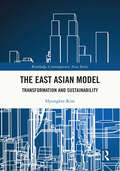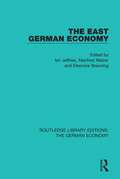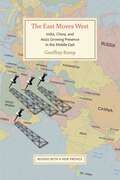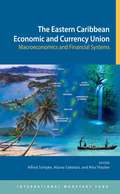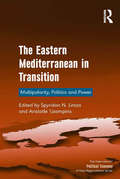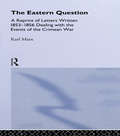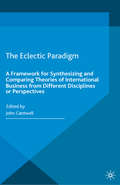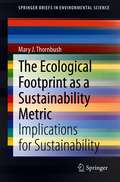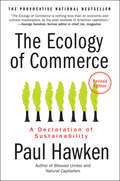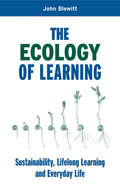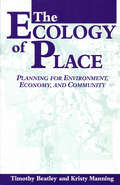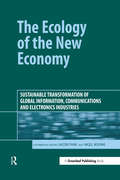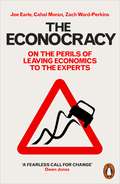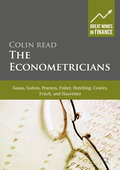- Table View
- List View
The East Asian Model: Transformation and Sustainability (Routledge Contemporary Asia Series)
by Hyungkee KimHyungkee Kim analyses the model of East Asian development as it existed during periods of high growth and how it was transformed by pressures from both the Washington consensus and its own internal contradictions. Many have discussed the successes and failures of the East Asian model, but Kim is concerned rather with the story of its transformation, and its long-term sustainability. He uses a Five Sector Model, which focuses on the, state, corporate, financial, labour, and foreign sectors to identify the core of East Asian model and examine the variants in Korea, Japan and China. He also outlines the distinctions between the East Asian model and Western development models including the Anglo-American, Rhine, and Nordic models. He analyses in detail the institutional changes such as marketization, privatization, liberalization, and flexibilization that have transformed the East Asian model. Highlighting the major problems that emerged from the transformation of the East Asian model, Kim assesses its prospects for economic, social and ecological sustainability and proposes an agenda for institutional reforms. An essential reading for scholars of East Asian political economy.
The East German Economy: From Honecker To Reunification (Routledge Library Editions: The German Economy #6)
by Ian Jeffries Manfred Melzer Eleonore BreuningOriginally published in 1987, this book brings together leading authorities from Germany and the USA who analyze how the East German economy actually operated - planning and management, pricing, investment and innovation, the financial system, agriculture and foreign trade (including the special concessions granted by the then Federal Republic of Germany). The volume is an insightful study of one of the least studied and most successful of socialist economies.
The East India Company and the Natural World
by Vinita DamodaranThis book is the first to explore the deep and lasting impacts of the largest colonial trading company, the British East India Company on the natural environment. The contributors - drawn from a wide range of academic disciplines - illuminate the relationship between colonial capital and the changing environment between 1600 and 1857.
The East Moves West
by Geoffrey KempWhile traditionally powerful Western economies are treading water at best, beset by crises in banking, housing, and employment, industrial growth and economic development are exploding in China and India. The world's two most populous nations are the biggest reasons for Asia's growing footprint on other global regions. The increasing size and impact of that footprint are especially important in the Middle East, an economic, religious, and geopolitical linchpin. The East Moves West details the growing interdependence of the Middle East and Asia and projects the likely ramifications of this evolving relationship. It also examines the role of Pakistan, Japan, and South Korea in the region.Geoffrey Kemp, a longtime analyst of global security and political economy, compares and contrasts Indian and Chinese involvement in the Middle East. He stresses an embedded historical dimension that gives India substantially more familiarity and interest in the region--India was there first, and it has maintained that head start. Both nations, however, are clearly on the rise and leaving an indelible mark on the Middle East, and that enhanced influence has international ramifications for the United States and throughout the world.Does the emergence of these Asian giants--with their increasingly huge need for energy--strengthen the case for cooperative security, particularly in the maritime arena? After all, safe and open sea-lanes remain an essential component of mutually beneficial intercontinental trade, making India and China increasingly dependent on safe passage of oil tankers. Or will we see reversion to more traditional competition and even conflict, given that the major Asian powers themselves have so many unresolved problems and that the future of the U.S. presence in the area is uncertain. Kemp believes the United States will remain the dominant military power in the region but will have to share some security responsibilities with the Asians, especially in the Indian Ocean.
The East Moves West
by Geoffrey KempWhile traditionally powerful Western economies are treading water at best, beset by crises in banking, housing, and employment, industrial growth and economic development are exploding in China and India. The world's two most populous nations are the biggest reasons for Asia's growing footprint on other global regions. The increasing size and impact of that footprint are especially important in the Middle East, an economic, religious, and geopolitical linchpin. The East Moves West details the growing interdependence of the Middle East and Asia and projects the likely ramifications of this evolving relationship. It also examines the role of Pakistan, Japan, and South Korea in the region.Geoffrey Kemp, a longtime analyst of global security and political economy, compares and contrasts Indian and Chinese involvement in the Middle East. He stresses an embedded historical dimension that gives India substantially more familiarity and interest in the region-India was there first, and it has maintained that head start. Both nations, however, are clearly on the rise and leaving an indelible mark on the Middle East, and that enhanced influence has international ramifications for the United States and throughout the world.Does the emergence of these Asian giants-with their increasingly huge need for energy-strengthen the case for cooperative security, particularly in the maritime arena? After all, safe and open sea-lanes remain an essential component of mutually beneficial intercontinental trade, making India and China increasingly dependent on safe passage of oil tankers. Or will we see reversion to more traditional competition and even conflict, given that the major Asian powers themselves have so many unresolved problems and that the future of the U.S. presence in the area is uncertain. Kemp believes the United States will remain the dominant military power in the region but will have to share some security responsibilities with the Asians, especially in the Indian Ocean.
The Eastern Caribbean Central Bank: Challenges to an Effective Lender of Last Resort
by Pablo Druck Mario DehesaA report from the International Monetary Fund.
The Eastern Caribbean Currency Union Institutions, Performance, and Policy Issues
by Ruby Randall Frits Van Beek José Roberto Rosales Mayra Zermeño Jorge ShepherdThe Eastern Caribbean Central Bank is one of just a few regional central banks in the world and the only one where the member countries have pooled all their foreign reserves, the convertability of the common currency is fully self-supported, and the parity of the exchange rate has not changed. This occasional paper reviews recent developments, policy issues, and institutional arrangements in the member countries of the Eastern Caribbean Currency Union, and looks at the regional financial system, its supervision, and the central bank's initiatives to establish a single financial space. the paper includes a large amount of statistical information that is not readily available elsewhere from a single source.
The Eastern Caribbean Economic and Currency Union: Macroeconomics and Financial Systems
by Alfred Schipke Nita Thacker Aliona CebotariA report from the International Monetary Fund.
The Eastern Mediterranean in Transition: Multipolarity, Politics and Power (The International Political Economy of New Regionalisms Series)
by Aristotle Tziampiris Spyridon N. LitsasThe wider region of the Eastern Mediterranean is in transition. What is being evinced is a situation of continuous volatility, centering on developments such as the ’Arab Spring,’ the Greek sovereign debt crisis, Islamic terrorism, the continuation of deadlock over the Cypriot and Palestinian Issues, significant energy finds in the Levantine Basin, concerns over nuclear proliferation and, more recently, the Syrian Civil War. At a systemic level, the move towards a regional multipolar reality has also contributed to volatility by creating a crescendo of antagonisms between all the major international actors who continuously strive for more influence, power and prestige. This collective project by leading experts represents a unique combination of International Theory and International Politics analysis that deals exclusively with the wider Eastern Mediterranean. It scrutinizes in a multidimensional manner the current geostrategic and geopolitical conditions that include the latest domestic socio-political events, as well as the active involvement of the Great Powers in the region. This book should be of interest to academics, decision-makers and a general reading public focusing on a significant and influential region in flux.
The Eastern Question: A Reprint Of Letters Written 1853-1856 Dealing With The Events Of The Crimean War (classic Reprint) (Research And Source Works #No. 279)
by Karl MarxFirst Published in 1994. Routledge is an imprint of Taylor & Francis, an informa company.
The Easy eBay Business Guide: The Story Of One Person's Success And A Step-by-step Guide To Doing It Yourself
by Cathy HayesFrom a few bits and pieces in a dusty loft to a profitable business with more than 20,000 sales and turnover of £100,000.00 in just one year. This book not only tells the story of how the author went from being an eBay buyer to a Top Rated Platinum Powerseller with over 12,000 positive feedbacks, but also provides the reader with a step by step easy to follow guide to launching a successful eBay business. Drawing from the Author's own experiences and skills acquired in her first year trading this book will help the reader avoid the pitfalls and mistakes she made and fast track their new enterprise on the road to success.
The Easy eBay Business Guide: The story of one person's success and a step-by-step guide to doing it yourself
by Cathy HayesFrom a few bits and pieces in a dusty loft to a profitable business with more than 20,000 sales and turnover of £100,000.00 in just one year. This book not only tells the story of how the author went from being an eBay buyer to a Top Rated Platinum Powerseller with over 12,000 positive feedbacks, but also provides the reader with a step by step easy to follow guide to launching a successful eBay business. Drawing from the Author's own experiences and skills acquired in her first year trading this book will help the reader avoid the pitfalls and mistakes she made and fast track their new enterprise on the road to success.
The Eclectic 18: turbo articles, riveting reviews, inspiring life insights from unique books, movies, broadcasts, and race events critiqued in Radioactive Drag Racing News
by Phillip Gary SmithWhat’s it like to be a maniac on a mission? From the worlds of performance engineering, product development, drag racing, auto racing and human creativity, go beyond with THE ECLECTIC 18. Learn tipping points key to the success of The Justice Brothers oil empire uncovered only here. Realize lessons from Funny Car NHRA pioneer John Force’s rise to racing supremacy and how his success - and failures - may improve your life. Discover the “Top Ten Tommy Teachings,” shocking ways to survive absolute terminal cancer from one driven competitor. Absorb how a car known as Big Noise II dominated a man’s life and a tragedy. What about “My First Car” of yours; how does it stack up against Hugh Hefner’s, Steve McQueen’s, and many others you will know? Just try to be as big and creative in your thinking as “TV Tommy Ivo, Drag Racing’s Master Showman.” Take to heart a real maniac on a mission: “Mickey Thompson, the Fast Life and Tragic Death of a Racing Legend.” Use these readings for their lessons in life, then apply them. Joyfully “Dance the Western Swing,” “Light the Dark,” plus recognize what happens when one doubles down in Vegas with nitro chips. Understand the spectacle resulting “When 10000 Horsepower Goes Wrong.” With THE ECLECTIC 18 you, too, may just be one of “The New Kids on the Winner’s Block” of life. Find deeper meanings and helpful insights on striving to succeed and becoming relevant that also entertains. “THE ECLECTIC 18 traded the safety of emotional equilibrium for their compulsion to unabashedly collide with life’s vicissitudes with unrelenting verve.” Jeff Kildahl, Ph.D., Creator and President, The Wholistic Edge®
The Eclectic Paradigm: A Framework for Synthesizing and Comparing Theories of International Business from Different Disciplines or Perspectives (JIBS Special Collections)
by John CantwellTo help to promote a greater conversation between those interested in the theoretical explanation of IB activities from various different backgrounds or starting points, this book offers a special Collection of JIBS articles which concern the foundations and the application of the eclectic paradigm.
The Eclipse of the Utopias of Labor (Forms of Living)
by Anson RabinbachThe Eclipse of the Utopias of Labor traces the shift from the eighteenth-century concept of man as machine to the late twentieth-century notion of digital organisms. Step by step—from Jacques de Vaucanson and his Digesting Duck, through Karl Marx’s Capital, Hermann von Helmholtz’s social thermodynamics, Albert Speer’s Beauty of Labor program in Nazi Germany, and on to the post-Fordist workplace, Rabinbach shows how society, the body, and labor utopias dreamt up future societies and worked to bring them about. This masterful follow-up to The Human Motor, Rabinbach’s brilliant study of the European science of work, bridges intellectual history, labor history, and the history of the body. It shows the intellectual and policy reasons as to how a utopia of the body as motor won wide acceptance and moved beyond the “man as machine” model before tracing its steep decline after 1945—and along with it the eclipse of the great hopes that a more efficient workplace could provide the basis of a new, more socially satisfactory society.
The Ecological Footprint as a Sustainability Metric: Implications for Sustainability (SpringerBriefs in Environmental Science)
by Mary J. ThornbushThis book examines the Ecological Footprint and biocapacity accounting within an applied development content for Costa Rica. By doing so, it is possible to track changes as well as perhaps link these to overarching global issues, such as trade, globalization, and food security, among other emergent topics based findings stemming from this methodology. Based on a timeseries since 1961, it is possible to track cross-temporal changes of land-type categories (for crop land, grazing land, forest land, fishing ground, built-up land, and carbon) of the Ecological Footprint and biocapacity conveying whether a country is in ecological deficit and what may be contributing to such a trend
The Ecological Modernization of the Chemical Industry: Predictors for Adoption of Innovations to Reach Carbon Neutrality in the Chemical Industry
by Hendrik Hermann AhrensIn this book key predictors of renewable feedstock adoption to achieve carbon neutrality in the European chemical industry are explored. Systematic data collection for the analysis was conducted through semi-structured expert interviews and document analysis, validating existing theories, including agent-based models of innovation diffusion, the multi-level perspective of socio-technical transition and technological innovation systems. The research findings led to insights on the key predictors of renewable resource adoption and support practitioners to manage the transition to carbon neutrality.
The Ecology of Commerce Revised Edition: A Declaration of Sustainability
by Paul HawkenThe Ecology of Commerce is the provocative national bestseller that addresses the necessity of merging good business practices with common sense environmental concerns. Nearly two decades after its initial publication, this controversial work by Paul Hawken has been revised and updated, arguing why business success and sustainable environmental practices need not—and, for the sake of our planet, must not—be mutually exclusive any longer. An essential work, Hawken’s The Ecology of Commerce belongs on the bookshelf of every concerned citizen—alongside Capitalism at the Crossroads by Stuart Hart and Al Gore’s Earth in the Balance and An Inconvenient Truth.
The Ecology of Commerce: A Declaration of Sustainability
by Paul HawkenA visionary new program that businesses can follow to help restore the planet.
The Ecology of Learning: "Sustainability, Lifelong Learning and Everyday Life"
by John BlewittYour house is flooded by 'unseasonal' heavy rain. What do you learn from this experience? Do you shrug your shoulders and call your insurer? Or do you choose to learn about climate change, switch to renewable energy and lobby politicians? In this insightful book, John Blewitt explores the possibilities for developing a sustainable society through 'lifelong learning' ? that is, learning that happens in everyday environments and activities as diverse as shopping, community, 'edutainment', information and communication technology, the internet, broadcasting, people's experience of place and space, green building, social networks and consumer culture. Drawing on a range of sociological, anthropological and educational studies as well as new research, The Ecology of Learning is ideal for educators, teachers, corporate trainers and consultants working to integrate environmental education, sustainability and innovation in non-traditional learning situations. The coverage is extensive, with an accessible but informed engagement with both theory and practice and a wide range of examples. Throughout, the voices, stories and experiences of many people are used to illustrate the ways people may reshape our understanding of learning and sustainability.
The Ecology of Place: Planning for Environment, Economy, and Community
by Timothy Beatley Kristy ManningThe Ecology of Place is a timely resource for planners, economic development specialists, students, and citizen activists working toward establishing healthier and more sustainable patterns of growth and development.
The Ecology of the New Economy: Sustainable Transformation of Global Information, Communications and Electronics Industries
by Jacob Park Nigel RoomeA "revolution" is taking place in the development of global information and communications technologies. In slightly more than a decade, the World Wide Web has gone from the idea of an obscure English scientist to a consumer-oriented technology system with an expected one billion users by 2005. The technologies that enable this to happen are advancing rapidly, which is leading to both an unprecedented number of start-up companies and a host of innovative new alliances between companies. The growth has been so rapid and unexpected that little research and analysis has yet been done on what impact this transformation has had or will have on the ability of companies to meet the global sustainability challenge. As environmental strategy has traditionally been portrayed in terms of risk cutting and resource efficiency, there is a danger that critical business issues such as information technology, R&D and e-commerce development are examined in isolation from the wider sustainable business perspective. An important objective of the book is to explore, document and raise awareness of sustainability concerns arising from the emerging global information economy. The information economy is defined in the broadest sense possible, including software, hardware, telecommunication – traditional and wireless – and advanced communication technologies. Some of the key issues and questions that are examined include:Case studies on how and to what degree sustainability concerns are being integrated into the business model of electronic, telecommunication and dot.com firms. The relationship between the diffusion of information and communication technologies and the energy and resource intensity of companies. The role of information and communication technologies in the shaping of policies for sustainability, its impacts on sustainable or unsustainable lifestyles and its implications for the interaction between companies and other actors. Corporations and the global digital divide. The Ecology of the New Economy will be of interest to academics, governments, businesses, and non-governmental groups who are trying to understand the linkages and relationship between the two of our greatest global challenges: the information revolution and environmental sustainability.
The Econocracy: On the Perils of Leaving Economics to the Experts
by Joe Earle Cahal Moran Zach Ward-PerkinsA century ago, the idea of 'the economy' didn't exist. Now economics is the supreme ideology of our time, with its own rules and language. The trouble is, most of us can't speak it. This is damaging democracy. Dangerous agendas are hidden inside mathematical wrappers; controversial policies are presented as 'proven' by the models of economic 'science'. Government is being turned over to a publicly unaccountable technocratic elite. The Econocracy reveals that economics is too important to be left to the economists - and shows us how we can begin to participate more fully in the decisions which affect all our futures.
The Econometric Modelling of Financial Time Series
by Terence C. Mills Raphael N. MarkellosTerence Mills' best-selling graduate textbook provides detailed coverage of research techniques and findings relating to the empirical analysis of financial markets. In its previous editions it has become required reading for many graduate courses on the econometrics of financial modelling. This third edition, co-authored with Raphael Markellos and first published in 2008, contains a wealth of new material reflecting the developments of the last decade. Particular attention is paid to the wide range of nonlinear models that are used to analyse financial data observed at high frequencies and to the long memory characteristics found in financial time series. The central material on unit root processes and the modelling of trends and structural breaks has been substantially expanded into a chapter of its own. There is also an extended discussion of the treatment of volatility, accompanied by a new chapter on nonlinearity and its testing.
The Econometricians
by Colin ReadThis is the seventh book in a series of discussions about the great minds in the history and theory of finance. While the series addresses the contributions of scholars in our understanding of financial decisions and markets, this seventh book describes how econometrics developed and how its underlying assumptions created the underpinning of much of modern financial theory. The author shows that the theorists of econometrics were a mix of mathematicians and cosmologists, entrepreneurs, economists and financial scholars. The author demonstrates that by laying down the foundation of empirical analysis, they also forever determined the way in which we think about financial returns and the vocabulary we employ to describe them. Through this volume, the reader can discover the life stories, inspirations, and theories of Carl Friedrich Gauss, Francis Galton, Karl Pearson, Ronald Aylmer Fisher, Harold Hotelling, Alfred Cowles III, Ragnar Frisch, and Trygve Haavelmo, specifically. We learn how each theorist made an intellectual leap simply by thinking about a conventional problem in an unconventional way.
